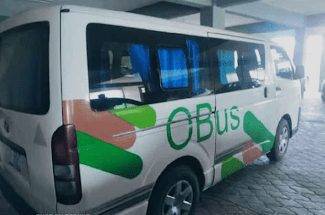With GoKada Down, Its High-Flying Competitor Strengthens Grip On The Market With New Bus-Hailing Platform

First, they came with promises of changing the face of Nigeria’s bike-hailing segment; a promise they seem well on course to delivering upon with ORide. And then they came up with something for commuters who prefer tricycles with another product called OTrike which only just launched in parts of southeastern Nigeria. Now, it’s OBus, the newest extension of OPay’s apparent onslaught on Nigeria’s transport-hailing sector.
This past weekend, OPay; a company backed by Opera and millions of dollars in investor money, formally launched OBus — its bus-hailing service — in Lagos, Nigeria; a development that came hot on the heels of the introduction of OTrike barely a week ago.
OPay started as a mobile payments platform in 2016 and this year, in particular, it is taking things to another level with its plans of becoming a multi-service commercial internet platform. In the past few months, it rolled out its bike-hailing platform called ORide and was even basically handing out rides for free at one point by charging a flat rate of NGN 100 for every trip in and around Lagos.
It looks like that was just its way of preparing the ground for what it had always sought to achieve: total domination of the Nigerian on-demand transport segment. In the last few weeks, OPay has taken ORide gone beyond Lagos to launch in Ibadan, while also rolling out platforms for personal loans, food delivery, and tricycle-hailing — all in the space of barely three months. And once again, they are it again with their newest addition; OBus.
Just like ORide and OTrike, OBus is a commuter transit service that operates using branded buses. For the moment, OBus rides will be restricted to intrastate trips within Lagos — the CMS-Ikeja route is the only route being plied for now. OBus has since been added to the Opay app and rides can be booked with it.
A staff of OPay told Techpoint that the edge OBus has over regular commercial buses which ply Lagos roads is the comfort it offers and ease of payment. The platform also supports cashless payments.
OBus trip fare payments are made using an OBus Card; a QR-enabled card that comes in different denominations — as low as NGN 200.00 (USD 0.55) and as high as NGN 2 K (USD 5.51). These cards can be purchased from OPay agents at various designated bus stops.
Payments for bus trips are made by placing the said card over a sensor reader inside the bus. The sensor then reads the ticket barcode which was generated through the mobile app before the trip and the withdrawal is made immediately.
An OBus Card can be used for multiple trips, up until there is no more credit. As an alternative, payments can also be made through the OPay wallet, as with other OPay services.
Backed by up to USD 50 Mn in funding, OPay appears to be going all out for a commanding share of Nigeria’s developing on-demand transport scene as it attempts to make its presence felt across all the branches of the sector.
But it wouldn’t be the first company that has tried to pull off something of this nature. Not too long ago, another bike-hailing company in Nigeria, GoKada, had quite literally tested the waters with G.Boat; a boat-hailing platform offering cheap, quick ferries from one end of Lagos to another, though it’s not clear if the service is still functional given that GoKada recently announced it was halting its bike-hailing operations indefinitely so as to put its house in order.
Featured Image Courtesy: TechPoint